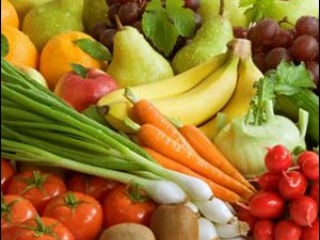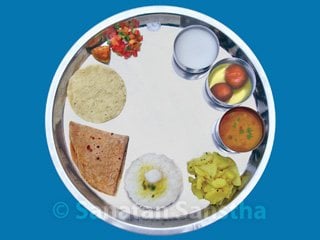Four to five decades ago, all family members would sit together for meals after washing their hands, legs and mouth, legs folded on a wooden seat and would commence their meals by reciting God’s Name.They would be served by the women in the house. Boys and girls in the house would be taught to arrange wooden seats and drinking water, to serve each food item in the plate, to clear the leftovers after meals and to clean the place with cow dung upon finishing the meals. Today, due to the decline in joint family system, influence of modernism and hectic life style, these aspects are neglected. Following the achars associated with meals and teaching them to the next generation has almost ceased.
1. Why is it essential to follow
the achars associated with meals?
It is said that ‘your diet defines your thoughts and your thoughts define your actions’. Only good actions can lead to spiritual progress. Hence, the root of spiritual sanskars is in sattvik (Sattva-predominant) diet. Along with sattvik diet, bhav (Spiritual emotion) associated while consuming food is also important. Understanding that ‘food is a form of Brahman’, considering it as Prasad (Holy sacrament) and consuming it while praying and chanting God’s Name will make the act of consuming food a sacred Yadnyakarma. This also is a part of spiritual practice.
Today, due to predominance of Raja-Tama components in the environment, the danger of attacks by negative energies through food is also high. Along with sattvik bhav associated while eating food, if the actual act of eating food is as per the science of Spirituality, then it protects the food and the individual eating food from attacks by negative energies. Such sacred food devoid of Raja-Tama components is easy to digest and assimilate.
The achars associated with eating food are divided into three parts, namely achars before eating a meal, achars during the meal and achars after the meal. These three parts include several achars such as offering Naivedya to God after preparing food, sitting with folded legs to eat a meal, eating lentil-rice first, taking a short walk after finishing the meals, etc. Inappropriate acts such as using a dining table and chair for having a meal, eating with spoon and fork, talking while eating, eating or drinking while standing, etc. should be avoided.
Once we know the spiritual science underlying eating a meal, we will not feel shy to follow these achars (For example – Praying to the Deity of worship by joining the hands before eating, making a protective sheath around the plate with water) while eating food at home and outside.
2. Eating food does not
mean merely filling the stomach
In Hindu Dharma, the karma (An act) of eating food, meaning, the achar of eating food is termed Yadnyakarma. A Yadnyakarma can only be performed on the strength of Tej (Absolute Fire Principle) enriched thoughts. If the process of digestion is to be accomplished on the strength of Tej, at the level of awakening the Suryanadi (Sun channel), every achar associated with food must be performed appropriately and the activity-based thought process related to karma should be followed. Only if this happens, the process of eating food can be termed ‘Yadnyakarma’. When an oblation is offered in the Yadnya, it is accepted by the Deities. In the same way, the oblation of food offered to the pinda (Subtle-body) in the form of the physical body with the help of jatharagni should be equally sattvik and enriched with Tej. Only then the Shakti (Divine Energy) in the pinda, contentedly accepts the oblation and blesses the pinda with thoughts of satisfaction created due to contentment.
2 A. Activation of the Suryanadi is essential
Since the karma of eating food is like offering an oblationto the pinda, the body is considered to be a sacrificial pit for this Yadnya. Since this act of offering oblation is performed on the strength of the Suryanadi, it receives the strength of Tej while eating. Achar followed at every stage of eating food activates the Suryanadi and kindles the dormant jatharagni in the void of the stomach.
2 B. Awakening of the Panchapraṇa
(Five vital energies) because of jatharagni
It is jatharagni that activates the Panchapraṇa in the body and increases the ability of the body to imbibe respective Principles of Deities from the environment. Awakening of the Panchapraṇa makes the body sensitive towards imbibing sattvik waves.
3. Chanting God’s Name is essential
to prevent interference from negative energies
Since the karma of eating food arouses desires of the dissatisfied souls, there is a likelihood of interference from dissatisfied souls and other negative energies in the environment. To prevent this, special care has to be taken during meals. Therefore, Hindu Dharma advises that these acts be performed with contemplative actions such as chanting God’s Name and eating with a bhav that the food is God’s Prasad. When every act is accompanied by praying, expressing gratitude and chanting God’s Name, it is termed ‘spiritual achar’. The foundation of activity in Achardharma lies in preserving the spiritual sanskars. Eating merely to fulfil desires is an achar at the physical level that is performed with the help of many thoughts of Maya (The Great Illusion). Such an achar is termed ‘achar at an emotional level’. When the ability of the mind adorned with sattvikta (Purity) is linked with activity, it results in sattvik karma. It is through the union of sattvik karma and activity that the real achars are created. Only such achars can liberate an individual from Raja-Tama components in every activity.
4. Achars associated with eating
Achars associated with a meal primarily consist of 3 stages – chanting God’s Name while eating, having a bhav that the food is being eaten as God’s Prasad and after the meal, contemplation on Sattva-predominant thoughts with a calm mind that will facilitate quick digestion. When every activity in achars prescribed for a meal is performed meticulously, Chaitanya (Divine consciousness) can be created through that achar. Thus, eating can become a spiritual karma, lead to purification of the pinda and help in attaining Moksha (Final Liberation).
Eating food with a bhav that it is being fed to God Himself, and becoming unaware of attaining divinity while doing so, amounts to actually practicing the doctrine of advait (Non duality) through the medium of food. This is termed as ‘leading a life after becoming one with God’. During every act in Hindu Dharma, the use of Divine language takes an individual from dvait (Duality) to advait. This by itself indicates the uniqueness of Hindu Dharma. Due to the attainment of divinity in the process of eating, attachment to food ceases; then many desire-related thoughts and acts are discarded, and the main objective of life (which is God-realisation) is attained.
Let eating food become a ‘Yadnyakarma’ !


 For healthy living avoid food that can cause antagonism due to contra-indications
For healthy living avoid food that can cause antagonism due to contra-indications Ill effects of artificial cold drinks
Ill effects of artificial cold drinks The connection between food and disease, important analysis on digestion
The connection between food and disease, important analysis on digestion The method of preparing rice is important !
The method of preparing rice is important ! Give up junk food and embrace Ayurveda
Give up junk food and embrace Ayurveda Should sweets be eaten at the beginning or end of a meal ?
Should sweets be eaten at the beginning or end of a meal ?